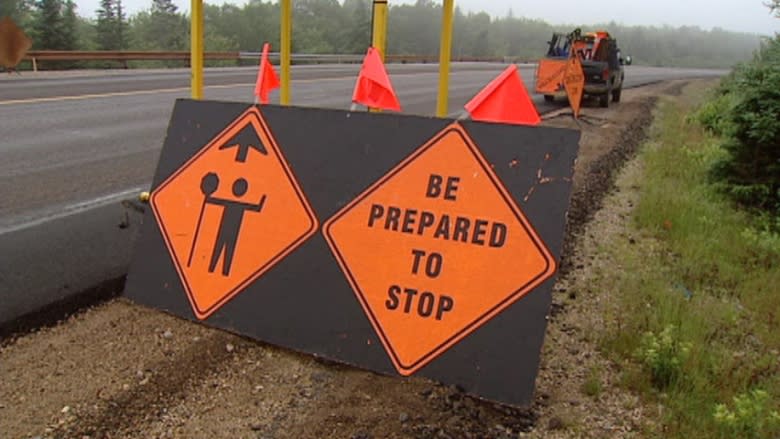Auditor general blasts province for poor management of roads, highways
Newfoundland and Labrador's auditor general released his latest report Friday, with a critical focus on how the provincial government manages its roads and highways.
In the report, Terry Paddon found issues in all stages of roadwork management — ranging from work done on the roads to the politicians who are making decisions in the Department of Transportation and Works.
The lack of a long-term pavement management system, the low importance placed on road work by MHAs, not meeting deadlines and incomplete performance evaluations for contractors were all highlighted by Paddon.
Other issues highlighted in the annual report include government's preparedness for changing demographics, compensation practices in government, provincial home support and issues around climate change.
Roadwork management
While roadwork standards "were comparable to industry practice," Paddon also found instances where the transportation department did not meet those standards.
One example was the decision to use very little tack coat on road projects between March 2002 to March 2008. Tack coat is a layer of tar used to bond layers of asphalt together.
"Use of tack coat improves load distribution and ensures that the different asphalt layers work as one unit, reducing the risk of defects," the report reads.
Asphalt and potholes
Paddon said the department didn't customize its projects to meet the needs of specific areas. For example, ensuring the proper thickness of asphalt is used in a certain location, or grading pavement so that it can handle a higher volume of traffic.
The lack of a proper pavement management system and long-term plan to ensure roads are monitored and maintained was also emphasized.
In the report, Paddon said the department's road maintenance manual wasn't being used and hadn't been updated since 1995.
Paddon also criticized the department's guidelines for pothole repairs, saying they were "outdated and inconsistently applied."
"If potholes are not filled with the proper material and in the correct way, they can reoccur and become larger and more hazardous to the public," he wrote.
In an email to CBC, the transportation department said it is launching an asphalt testing pilot project in July, which will examine what asphalt forumula is best suited for the Newfoundland and Labrador climate and environment.
Prioritizing the worst roads
In the report, Paddon also criticized the way in which the department prioritizes roadwork.
While the department receives a priority list from five different regions across the province, Paddon believes MHAs may sometimes cause lower priority work to be completed before higher priority projects.
He said sometimes even priority lists themselves contain errors, which calls into question their usefulness.
"This could mean that roads with lower safety risks were addressed before roads with greater safety risks," he wrote.
Paddon also said in the 13 projects he reviewed, contract deadlines were missed for all of them, which needlessly puts drivers at risk due to delays and poor road conditions.
The report suggests that government improve its method for ensuring roadwork is tendered on time and how it monitors progress and completion of work — including bolstering how it evaluates the performance of contractors.
In January, government announced its five-year roadwork plan, and addressed some of the concerns in Paddon's report.
That included a commitment to ensure roadwork is based on merit, not politics. Paddon said those documents were outside the scope of the report released Friday.
Aging population ignored
The report also focussed on government's lack of preparedness for changing demographics in the province and how it will play out in the years to come.
As of July 2016, 19 per cent of the total population of Newfoundland and Labrador was 65 years and over. By 2036, the province forecasts that one-third of the population will be 65 years and over.
But Paddon said there is no long-term financial plan in place that considers the impact of an aging population or migration within the province.
He adds that there's no overall strategy for dealing with these demographic changes, either for the province as a whole or within most individual departments.
Compensation
The report also addresses the $3.7 billion in total salaries and benefits government paid out to public employyees in 2015-16, with Paddon adding that official policy and reality don't always add up.
"The seven government entities we audited had a number of compensation policies and practices related to position classifications, salaries, employee benefits and termination benefits that were inconsistent with government policy," he wrote.
Home support program
Another area that Paddon took issue with was the provincial home support program. He looked at practices within Eastern Health and Western Health, and found that authorities did not always complete clinical and financial assessments in time, and did not reassess seniors each year.
Annual financial reports and records of seniors who self-managed their home supports were not always received or reviewed, Paddon wrote, and proper follow-ups were not always given to seniors who didn't receive the home support hours they had been approved for.
Climate change
The final portion of the AG report deals with the province's 2020 commitment to reduce greenhouse gas emissions by 10 per cent below what they were in 1990.
Paddon said government did not implement sufficient measures to achieve that target, and is also not on track to meet its 2011 Climate Change Action Plan, despite taking measures "intended to adapt to the impacts of climate change."
The full 2017 annual report can be found on the Auditor General's website.












